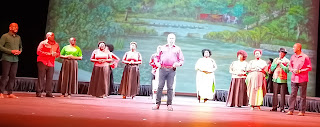It's almost the eve of the Tallawah Mento Band and the Jamaican Folk Review's historic trip to Ghana to compete in Panafest 2025.
The taste they gave attendees at the Lauderdale Performing Arts Center was more like a bellyful.
A bellyful of music, laughs, dance, kumina and happinesses!
Panafest (the Pan African Festival of Arts and Culture), is a biennial event established in Ghana in 1992 to unite Africans in the diaspora and on the continent and celebrate their resilience and African identity.
 |
| Colin Smith, founder of Tallawah Mento Band and a cultural icon in his own right, explains the concept. |
 |
| Kumina time |
 |
| The talented cast |
Panafest was the brainchild of the late, great Pan Africanist play right/author, Efua Sutherland.
It has become a landmark festival in Ghana that gives Africans an opportunity to learn from each other wherever they are .
This years theme is "Ensuring the African Kinship: Our Essence, Our Well-being, Our Prosperity."
Significantly, this is the first time a folkloric Jamaican entry will be involved in this auspicious, two weeks event.
It took the Louise Bennett Coverly Heritage Council to make it happen.
If the taste we in Florida got is anything to go by, our entry will make a huge impact on the minds of Africans at home and abroad. It traces our progress through music and dance, from emancipation to victory.
The performance also highlighted the contribution of world renowned artists such as Peter Tosh. Bob Marley, Jimmy Cliff and the foot stomping energy of kumina music and dance, in uplifting the souls of the once downtrodden people.
We look forward to our particants returning home with many medals for this creative, entertaining and educational performance.
Although the crowd of attendees was enthusiastic and participated in song and dance, in my book the numbers fell short of expectation for this important fund-raising event, especially in Florida where so many Jamaicans reside.
Ps. Follow the link below for an excellent review of their performance in Ghana.
https://wiredja.com/index.php/categories/newsberg/culture/africa-the-jamaican-folk-revue-and-tallawah-mento-band-performs-at-cape-coast-castle-ghana-the-heritage-preserved










































